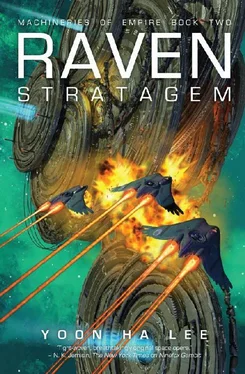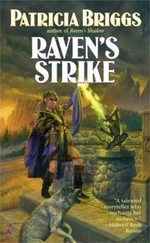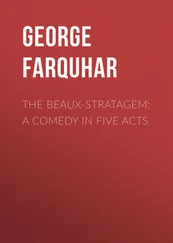“Would you feel better if you did?” Khiruev asked.
“I doubt it, but I wonder all the same.”
“I was never tempted to contract for children,” Khiruev said. “I don’t feel strongly about them one way or another. They’re loud and messy”—she’d never forget the expression on Mother Ekesra’s face that time she’d shorted out one of her pastry machines—”but if they weren’t like that there’d be something wrong with them.”
She also remembered Mother Allu complaining once to Mother Ekesra, She’s so quiet, and Ekesra’s reply that at least she wasn’t getting into trouble.
“The hardest thing Kel Command ever made me do was shoot children.” Jedao’s voice was soft.
Khiruev hadn’t known about this, but then, her interest in historical generals had been confined to their strategies and tactics rather than biographies. “Secondary casualties are always difficult,” she said neutrally.
“I’m not a linguist, but do you ever think there’s something wrong with the things we do and don’t have words for?”
So this was what Jedao had been leading up to. “Sir,” Khiruev said, with a hint of a bite, “they didn’t have formation instinct in your day.” Jedao’s mouth twisted as though that had brought something to mind, but if so, he kept it to himself. “And you’re a Shuos, anyway. Why didn’t you do something?”
“You know what?” Jedao said. “The Kel called me the fox general, although there was a Shuos brigadier general who overlapped my service, a staffer posted somewhere obscure. But the Shuos called me a hawk.”
Khiruev waited for an answer, or some moral, some further revelation. Instead, Jedao called up a digest of news reports and a regional map hazed with annotations. “Sometimes it amazes me how big we’ve gotten,” Jedao said, and smiled with predatory benevolence. “Tell me, what do you know about that system?” He struggled with the map before getting it to focus on Weraio 5.
“It’s one of a thousand conflagrations,” Khiruev said wryly. She had paid it more attention than most not because it was noteworthy in itself—sporadic outbursts of calendrical warfare and student demonstrations on the subtropical archipelago, yes, but many planets suffered similar incidents—but because she’d visited it twice. If you avoided the hotspot archipelago, it could be a perfectly reasonable vacation. She hated warm weather, which reminded her of home, and had instead gone for a tour of the city of Miifau, famed, if you followed that sort of thing, for its orchestra. Every time the Weraio system came up in the digests, she’d scanned them for any mention that Miifau’s orchestra had gotten bombed. It was a stupid thing to care about, especially when so many people died everywhere, in every passing moment. Yet the fractal nature of the hexarchate’s fight against heresy made it impossible to care about those blotted numbers.
Khiruev doubted Jedao cared particularly about Weraio 5, other than having zeroed in on Khiruev’s own interest in it, even if it was theoretically possible that he had caught word of a nasty development from that direction. But Weraio wasn’t located anywhere strategic and was yet some distance from the Hafn incursions. Instead, Khiruev said, “Sir, we”— I —“will be of more use to you if we have some indication of the next objective.”
So far Jedao had maneuvered them past the Fortress of Spinshot Coins and toward the Hafn while keeping them from engaging any Kel, either by luck, an intelligence system he had yet to reveal to Khiruev, or intimidating Kel Command from a distance. Khiruev didn’t expect Jedao to level with her about his grand strategy. At the same time, Jedao couldn’t expect anyone to take his motives at face value, either.
“What, thrashing the Hafn isn’t good enough for you?” Jedao said.
Khiruev suppressed a shiver. She had long practice hiding her reactions, dubious benefit of growing up in a household with a mother who terrified her. Still, taken literally, a question was a question.
“If all you cared about was the defeat of the Hafn,” Khiruev said, “you could have left that to the Kel after whatever happened at Scattered Needles. Flitting around the hexarchate with a renegade swarm merely advertises our weakness to the enemy, especially since they’ve already engaged us.”
“All right, then,” Jedao said, “what is it you think I do care about? And why bring it up now, General, and not earlier?”
“Does every card player you encounter give away everything after the first hand?” Khiruev said. Brezan, for instance, had a terminal inability to bluff. Not coincidentally, he stayed out of high-stakes jeng-zai.
Jedao’s smile flickered at her like a candle flame. Khiruev caught herself wishing it had lasted longer. Nevertheless, for all that the argument was transparently designed to appeal to a gambler, Jedao didn’t draw it out. “Fair enough,” Jedao said. He fell silent, and Khiruev was reminded that Jedao hadn’t answered the first question.
Khiruev, no longer young, had not dueled except casually in years. But she had a counter ready. “Why is it,” she said, “that you’re so determined to teach me how to think autonomously? What would that give you that simple obedience wouldn’t?”
Jedao leaned back, began to put his feet up on the table between them, caught himself. The whole sequence looked so natural. Khiruev wasn’t fooled. “Simple obedience won’t suffice for what I have in mind,” Jedao said. “Never mind that for now. Tell me what I’m really up to, since I’ve apparently lost my ability to bluff.”
Highly unlikely. But then, Jedao’s arched eyebrow suggested that he hadn’t meant the remark seriously. At any rate, Khiruev was stuck in the role of pupil. She didn’t care to dispute Jedao’s superior experience anyway.
“I can only assume that you’re at war with the hexarchs,” Khiruev said, “and that the Hafn are only useful insofar as you can use them against the hexarchs, or to gain influence with the mass of citizens.” Anyone could have come to the same conclusion. But Khiruev had the nagging sense that she shouldn’t have approved of this goal as much as she did, considering how long she had served the Kel loyally.
“The great difficulty of a Kel army,” Jedao said with surprising bitterness, “is that there’s no one to tell me when I’m wrong.”
“You can’t possibly hope to prevail.”
Jedao’s grin had just a glint of teeth. “Funny, that’s what Commander Chau said going into Candle Arc.”
The only reason Jedao wasn’t best-remembered for Candle Arc—a space battle in which he’d been outnumbered eight to one and still smashed the enemy—was the massacre. “You said yourself that the hexarchate is a big place,” Khiruev said. “Eight to one is nothing compared to what you face now. ‘Outnumbered’ doesn’t begin to describe it.”
“That’s what everyone says. And so the hexarchs keep their stranglehold on the populace.”
The stirring of hope that rose in Khiruev was ridiculous. How could Jedao hope to coordinate a rebellion across the entire hexarchate? As the heretics proved, over and over, rebelling was easy. The coalescence of a viable successor government was another matter. And yet, she wanted to warm herself by that hope: proof that she was a suicide hawk.
Jedao rose all at once, not graceful so much as efficient, and stood before Khiruev. No wonder he’d been a fabled duelist in his first life, that flawless balanced poise. He looked down at Khiruev, intent, unsmiling. “Tell me what you want me to do,” he said, as if he hadn’t lined up all the advantages on his side of the conversation.
Khiruev’s heart contracted. “Sir,” she said, as steadily as ever, “I wouldn’t presume.”
Читать дальше












